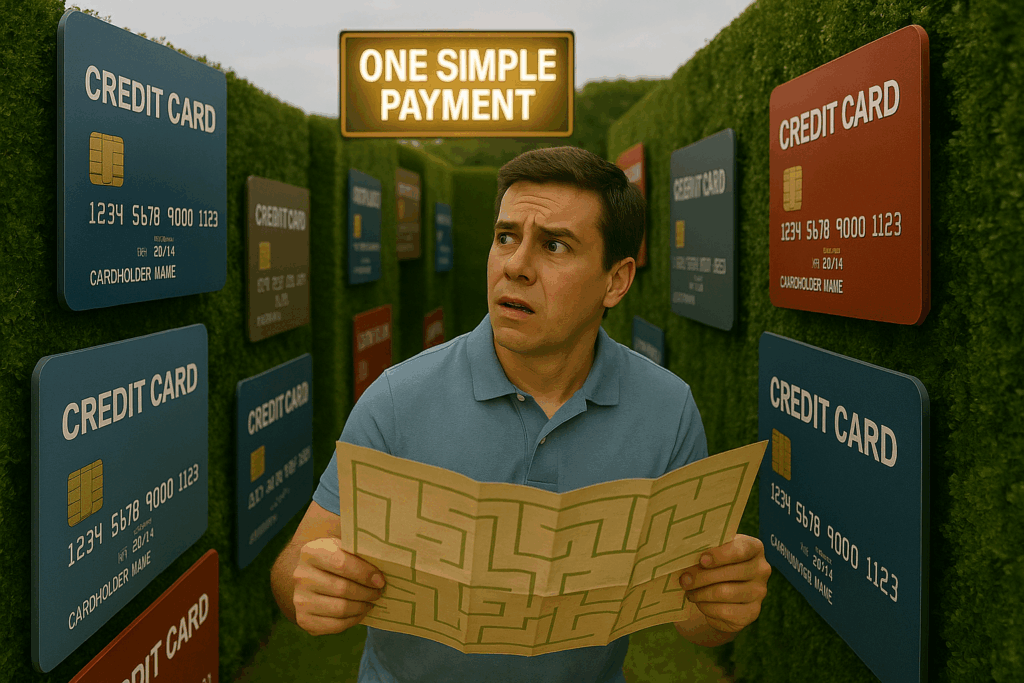5 Ways to Consolidate Credit Card Debt

If you’re struggling with high-interest credit card debt, consolidation can be an effective way to manage and pay it off faster. By combining multiple debts into one, you may lower your interest rate and simplify your payments. Here are 5 ways to consolidate credit card debt and choose the best option for your financial situation.

1. Use a Balance Transfer Credit Card
A balance transfer credit card allows you to move existing credit card balances to a new card with an introductory 0% annual percentage rate (APR). This interest-free period can last up to 21 months, giving you time to pay off your debt without accumulating additional interest.
Best for: Individuals with good to excellent credit (FICO Score of 670 or higher) who have manageable debt and can pay it off before the promotional period ends.
Pros:
- Interest-free period helps pay down debt faster.
- Some cards offer rewards and perks.
- No annual fee on most cards.
Cons:
- The credit limit may not cover all your debt.
- Balance transfer fees of 3% to 5% may apply.
- Risk of adding more debt if spending isn’t controlled.
2. Take Out a Personal Loan
A personal loan provides a lump sum to pay off your credit card balances. These loans often have lower interest rates than credit cards and come with fixed repayment terms, making budgeting easier.
Best for: Borrowers with good credit who want a structured repayment plan and a lower interest rate than their current credit cards.
Pros:
- Fixed payments help with budgeting.
- Potentially lower interest rates.
- Speeds up debt repayment.
Cons:
- Not all borrowers qualify for a low-interest loan.
- Some lenders charge origination fees (1% to 12%).
- No interest-free promotional period.
3. Tap Into Home Equity
If you own a home, you can use a home equity loan or a home equity line of credit (HELOC) to consolidate credit card debt. These options often have lower interest rates because they are secured by your home.
Best for: Homeowners with significant equity who are comfortable using their home as collateral.
Pros:
- Lower interest rates compared to personal loans and credit cards.
- Longer repayment terms can reduce monthly payments.
- HELOCs allow for flexible borrowing.
Cons:
- Your home is at risk if you can’t make payments.
- Closing costs can be high (up to 5% of the loan amount).
- Declining home values could lead to owing more than your home is worth.
4. Enroll in a Debt Management Plan
A debt management plan (DMP) through a credit counseling agency consolidates your credit card debt into a single monthly payment. The agency may negotiate lower interest rates and better repayment terms with creditors.
Best for: Individuals struggling with high credit card balances who need professional help managing their debt.
Pros:
- Lower interest rates may reduce overall repayment costs.
- Single monthly payment simplifies finances.
- No credit score requirement.
Cons:
- You must close existing credit card accounts.
- Timely payments are required to stay in the plan.
- Not all creditors participate in DMPs.
5. Withdraw From Your 401(k)
Borrowing from your 401(k) may provide funds to pay off credit card debt, but it comes with risks. While 401(k) loans typically have low interest rates, withdrawing funds early can trigger taxes and penalties.
Best for: Individuals with no other loan options who are confident they can repay the amount without affecting retirement savings.
Pros:
- No credit check required.
- Interest payments go back into your 401(k) account.
- Lower interest rates than credit cards.
Cons:
- Reduces retirement savings and investment growth.
- Early withdrawals may incur penalties and taxes.
- Leaving your job may require immediate repayment.
Should You Consolidate Your Credit Card Debt?
Before choosing one of the 5 ways to consolidate credit card debt, consider your financial situation and goals. Consolidation may be a good idea if:
- You have significant credit card debt and need a structured repayment plan.
- You qualify for a lower interest rate.
- Managing multiple payments is overwhelming.
- Your monthly payments stretch your budget too thin.
However, consolidation may not be the best choice if:
- You can pay off your credit cards within a year.
- You can’t qualify for better terms.
- You haven’t addressed the habits that led to high debt.
Alternative Strategies to Pay Off Credit Card Debt
If consolidation isn’t the right fit, consider the debt snowball or debt avalanche methods.
- Debt Snowball: Pay off the smallest debt first while making minimum payments on others. Once the smallest debt is paid, move to the next smallest.
- Debt Avalanche: Focus on paying off the debt with the highest interest rate first to minimize total interest paid.
Final Thoughts
Exploring these 5 ways to consolidate credit card debt can help you find the best path toward financial freedom. Whether you choose a balance transfer, personal loan, home equity, debt management plan, or 401(k) loan, the key is to commit to responsible repayment. By focusing on eliminating your debt, you’ll regain control of your finances and build a stronger financial future.
If you ever need expert assistance or guidance on your credit journey, don’t hesitate to reach out to the Nerds! Additionally, stay updated with the latest tips and information by following us on Facebook, Instagram and TikTok!

